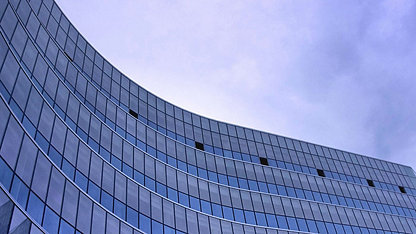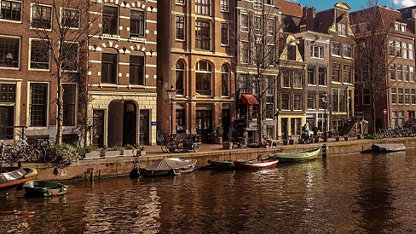RICS Scotland is delighted to today set out further details of its COP26 activity over the coming weeks. RICS is keen to work with members to promote their own activities, case studies, and events. If you have any questions, would like to get involved in our content development, or if RICS can help promote your own activities, please get in touch with eryan@rics.org.
The built environment is responsible for around 40% of global carbon emissions. COP26 therefore provides the opportunity to drive lasting change in decarbonising the sector. While building less and making use of existing assets is key, there remains a need for new infrastructure to deliver improved social and economic outcomes. It is therefore crucial that sustainable practices are adopted, and that the built environment decarbonises fast.
Chartered surveyors play a pivotal role in addressing the challenges of climate change by providing the data to drive decarbonisation across the whole lifecycle of the built environment. RICS has an exciting programme of work planned for COP26, and the sustainability space more broadly. From launching International Cost Measurement Standard 3 (ICMS3) and the Built Environment Carbon Database, to shaping incoming Government regulations as part of the Heat in Buildings Strategy, RICS and the Chartered Surveyor profession will be essential in enabling the net zero transition.
RICS COP26 timeline:
- 14 October: Green construction and the Built Environment, with City of Edinburgh Council and Edinburgh Chamber of Commerce.
- 28 October: Sustainable construction: The circular economy, with Balfour Beatty and GLM.
- 4 November: RICS COP26 Reception.
- 9 November: Transforming commercial property: The route to net zero, with SpACE.
- 11 November: ICMS3: A world first for carbon management in the built environment, with the University of Glasgow.
- Late November: Surveyors for Net Zero – The role of the profession, with the Scottish Parliament.
A detailed overview of the activities in Scotland can be seen below.
RICS COP26 Reception
What? RICS’ flagship event of COP26 will see members hear from RICS’ newly elected President Clement Lau, Scotland Regional Chair Richard Burnett, and a representative from the Scottish Government. It will also allow members to network in person over light refreshments, just like the old days! A small group of RICS representatives will then attend the CBI International Dinner to ensure representation of the profession at the highest level of political and industry discussion.
Green construction and the Built Environment
With City of Edinburgh Council and Edinburgh Chamber of Commerce
What? RICS Director of Public Affairs and Thought Leadership, Ken Creighton will chair this virtual event, looking at exemplar sustainable developments across Edinburgh and the importance of designing sustainable buildings more broadly. The event is sponsored by SSE Energy Solutions and features representatives from Balfour Beatty, Edinburgh World Heritage, Bennetts Associates, and Copenhagen’s Integrated Urban Renewal.
Sustainable construction: The circular economy
With Balfour Beatty and GLM
What? A virtual roundtable for RICS members, featuring a presentation and Q&A with Balfour Beatty Environment Manager Poul Wendhansen and GLM Director Aythan Lewes, who will discuss innovations in the circular economy, including the development of geopolymer concrete as a potential net-zero alternative, and the importance of pre-demolition audits.
Transforming commercial property: The route to net zero
With the Space for Architecture, Carbon and the Environment (SpACE)
What? RICS is leading a panel discussion event as part of the SpACE initiative in Edinburgh, focusing on the role of commercial property in transitioning to net zero. Working alongside Jones Lang Lasalle (JLL) and other partner organisations, discussions will focus on driving net zero in the operation of buildings, the impact of sustainability initiatives on market value, and future policies and regulations.
ICMS3: A world first for carbon management in the built environment
With the University of Glasgow
What? RICS Director of Construction Standards, Alan Muse, will present on the development of ICMS3 as part of the University of Glasgow’s Cities and Built Environment day activity. Fundamental to enabling sustainable decisions is being able to measure and compare carbon in construction projects. ICMS 3 enables the interoperability of data across the life cycle of projects, and this standardised data across markets will enable a clear assessment of the trade-offs between cost and carbon.
Surveyors for Net Zero – The role of the profession
With the Scottish Parliament (in development)
What? RICS is developing a Parliamentary roundtable which will bring Parliamentarians together with RICS members to discuss case studies and projects on the ground, demonstrating the crucial work of Chartered Surveyors in enabling a net zero transition.
RICS global activity
Head of Thought Leadership, Tim Smith
COP26 presents an opportunity for the profession and RICS to showcase how, together, we are pioneering sustainable practices across the built and natural environment drive positive social impact. It will also enable us to further empower professionals to embed sustainability across the life-cycle of projects and assets.
Every single one of our 137,000 professionals has a role to play in being the enablers and agents of change across the industry. Collectively we deliver practical solutions, trusted data and insights that equip people and businesses to make informed decisions, mitigating negative environmental impact.
As such, we are going to be creating and curating a programme of activities and initiatives that will:
- Showcase how RICS and the profession are pioneering sustainable practices across the built and natural environment that drive positive social and environment impact
- Deliver practical solutions, trusted data and insights that equip people, governments, and businesses to make informed decisions mitigating negative environmental impact
- Empower professionals to embed sustainability across the lifecycle of projects and assets.
To achieve our ambition, we will be launching a series of global initiatives leading up to Glasgow, and beyond; our work after COP26 will be just as important as the work before.
One Industry: One Challenge
The One Industry: One Challenge summits (roundtables) will be one of the key pillars of our COP26 activity. They will be structured so that we bring together the key actors from across the industry to discuss how key sectors can make and can continue to make a material impact in reducing emissions across the built environment, as well as preserving biodiversity.
These will take place after COP26 in order for the industry to come together and collectively decide the best way forward to achieve the goals set out in November.
Our Future, our planet
Mobilising, inspiring and showcasing our young professionals is key. Currently we have 31,206 young members (18-35) which goes from APC candidates all the way through to Fellows from every market. This accounts for nearly one quarter of our global membership.
In simple terms, these are our future leaders, our current and future experts, and the current and future strategic advisers across the industry and importantly the ones that will be leading the climate change and sustainability challenge for decades to come. Furthermore, they are the ones that will inspire the next generation of talent to enter the profession.
Our Future, Our Planet will be an essay competition for these professionals working across our various sectors. There will be four sector categories: Land and natural resources, valuation, construction and infrastructure and property/facilities management.
They will be asked to write 1000 words on their ideas/solutions to deliver/contribute to net zero and 1.5c in their sector.
The winners will be invited to attend WBEF free of charge, as well as making them monthly WBEF columnists for 12 months.
In addition, we would take the top 3 from each category and publish as a collection of essays post-COP.













